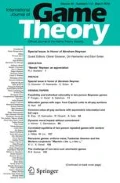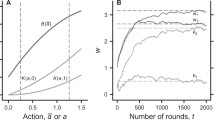Abstract
We consider a learning dynamic in which players imitate and better reply. Sufficient conditions are provided for Nash equilibrium play to emerge over time. The role of imitation in the learning dynamic is discussed through a series of examples. Most interestingly we demonstrate how imitation can ‘help’ the emergence of Nash equilibrium where ‘more rational’ methods do not.
Similar content being viewed by others
References
Alós-Ferrer C, Ania AB, Schenk-Hoppé KR (2000) An evolutionary model of Bertrand oligopoly. Games Econ Behav 33:1–19
Asch S (1952) Social psychology. Prentice Hall, New York
Bernheim BD (1994) A theory of conformity. J Polit Econ 102:841–877
Cartwright E (2003) Learning to play approximate Nash equilibria in games with many players. University of Warwick Working Paper no. 671
Deutsch M, Gerard HB (1955) A study of normative and informational social influences upon individual judgement. J Abnormal Soc Psychol 51:629–636
Ellison G, Fudenberg D (1993) Rules of thumb for social learning. J Polit Econ 101:612–643
Ellison G, Fudenberg D (1995) Word-of-mouth communication and social learning. Q J Econ 110:93–125
Friedman JW, Mezzetti C (2001) Learning in games by random sampling. J Econ Theory 98:55–84
Fudenberg D, Levine DK (1998) The theory of learning in games. MIT Press, Cambridge
Gale D, Rosenthal R (1999) Experimentation, imitation and strategic stability. J Econ Theory 84:1–40
Gigerenzer G, PM Todd, the ABC Research Group (1999) Simple heuristics that make us smart. Oxford University Press, Oxford
Gross R (1996) Psychology: the science of mind and behaviour. Hoddon and Stoughton, London
Jones S (1984) The economics of conformism. Blackwell, Oxford
Kalai E (2004) Large robust games. Econometrica 72:1631–1665
Levine D, Pesendorfer W (2007) The evolution of cooperation through imitation. Games Econ Behav 58:293–315
Monderer D, Shapley LS (1996) Potential games. Games Econ Behav 14:124–143
Offerman T, Potters J, Sonnemans J (2002) Imitation and belief learning in an oligopoly experiment. Rev Econ Stud 69:973–997
Ritzverger K, Weibull JW (1995) Evolutionary selection in normal form games. Econometrica 63:1371–1399
Schlag KH (1998) Why imitate, and if so, how? A bounded rational approach to multi-armed bandits. J Econ Theory 78:191–209
Selten R, Ostmann A (2001) Imitation equilibrium. Homo Oeconomicus 43:111–149
Selten R, Apesteguia J (2005) Experimentally observed imitation and cooperation in price competition on the circle. Games Econ Behav 51:171–192
Van Huyck JB, Battalio RC, Beil RO (1990) Tacit coordination games, strategic uncertainty and coordination failure. Am Econ Rev 80:234–248
Vega-Redondo F (1997) The evolution of Walrasian behavior. Econometrica 65:375–384
Wooders M, Cartwright EJ, Selten R (2006) Social conformity in games with many players. Games Econ Behav v 57:347–360
Young HP (2001) Individual strategy and social structure. Princeton University Press, New Jersey
Author information
Authors and Affiliations
Corresponding author
Rights and permissions
About this article
Cite this article
Cartwright, E. Imitation, coordination and the emergence of Nash equilibrium. Int J Game Theory 36, 119–135 (2007). https://doi.org/10.1007/s00182-007-0077-2
Accepted:
Published:
Issue Date:
DOI: https://doi.org/10.1007/s00182-007-0077-2



